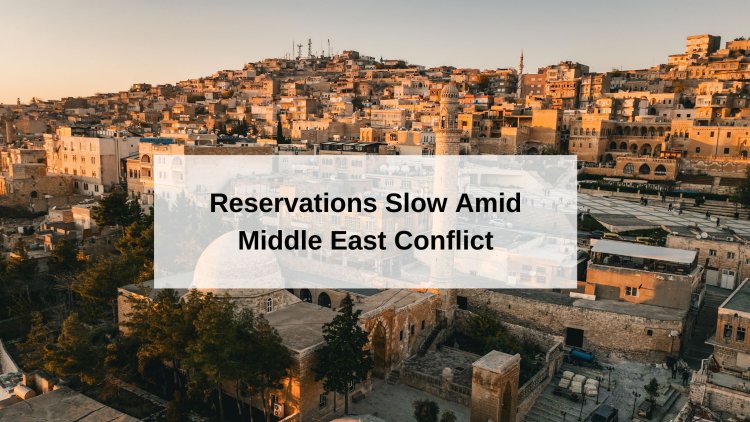Booking Says Room Reservations to Slow Amid Middle East Conflict
Room reservations decline amidst Middle-East conflict. Book with confidence despite uncertainties. Secure your stay with Booking.

In the heart of turmoil lies a ripple effect that extends far beyond the boundaries of conflict zones. As tensions escalate in the Middle East, the repercussions are felt across various sectors, including tourism and hospitality. In recent updates, Booking Holdings Inc., one of the world's largest online travel agencies, has reported a notable slowdown in room reservations amidst the ongoing conflict in the region. This downturn in bookings not only reflects immediate concerns for travelers' safety but also underscores broader economic implications and shifts in consumer behavior. In this article, we delve into the reasons behind the decline in room reservations, analyze the impact on the hospitality industry, and explore potential strategies for navigating through these challenging times.
The Current Landscape of Middle-East Conflict
At the heart of the matter lies the escalating conflict in the Middle East, with geopolitical tensions flaring up and creating an atmosphere of uncertainty. From airstrikes to political unrest, the region is grappling with a myriad of challenges that have significant implications for various sectors, including tourism and hospitality. Amidst this backdrop, Booking Holdings Inc., the parent company of popular booking platforms like Booking.com, has recently reported a slowdown in room reservations. This slowdown serves as a barometer of consumer sentiment, reflecting apprehensions and concerns regarding travel to the region.
Factors Contributing to the Slowdown in Middle-East
Several factors contribute to the decline in room reservations amidst the Middle-East conflict. Firstly, safety concerns loom large in the minds of potential travelers. With reports of escalating violence and instability, many tourists are hesitant to venture into areas deemed high-risk. Additionally, travel advisories issued by governments and international organizations further dissuade individuals from visiting conflict-affected regions.
Furthermore, the uncertainty surrounding the conflict creates logistical challenges for travelers. Fluctuating flight schedules, border closures, and heightened security measures add layers of complexity to trip planning, deterring even the most adventurous globetrotters. Moreover, the perception of the Middle East as a volatile region perpetuates negative stereotypes, leading to a decline in demand for accommodations in affected areas.
Impact on the Hospitality Industry
The slowdown in room reservations has profound implications for the hospitality industry across the Middle East. Hotels, resorts, and other lodging establishments are faced with dwindling occupancy rates and reduced revenue streams. For many businesses already reeling from the economic fallout of the pandemic, the current situation exacerbates financial woes and strains operational capabilities.
In addition to immediate financial concerns, the downturn in bookings poses long-term challenges for the hospitality sector. Reputation damage stemming from safety concerns and negative media coverage can tarnish the image of destinations, deterring future travelers even after the resolution of conflicts. Moreover, the ripple effects extend beyond accommodation providers to encompass a wide array of ancillary services, including restaurants, tour operators, and transportation providers, all of which rely on a steady influx of tourists to sustain their operations.
Navigating Through Uncertain Times of Middle-East Conflict
Despite the challenges posed by the Middle-East conflict, there are strategies that businesses can employ to navigate through these uncertain times. Firstly, prioritizing safety and security measures is paramount to instilling confidence among travelers. Hotels and other lodging establishments should implement rigorous safety protocols, ranging from enhanced security measures to comprehensive risk assessments, to reassure guests of their well-being.
Moreover, fostering transparent communication channels is essential for managing expectations and addressing concerns proactively. Providing timely updates on the security situation, travel advisories, and operational changes can help mitigate uncertainties and build trust with customers. Additionally, offering flexible booking policies and refund options provides travelers with peace of mind and incentivizes them to consider booking despite prevailing uncertainties.
Furthermore, diversifying marketing efforts to target domestic and regional markets can help offset the decline in international bookings. Promoting staycation packages, local attractions, and unique experiences tailored to the preferences of domestic travelers can stimulate demand and provide a lifeline for businesses amidst challenging external conditions.
Analyzing the Economic Implications
Beyond the immediate concerns for individual businesses, the slowdown in room reservations due to the Middle-East conflict carries significant economic implications for the region as a whole. Tourism plays a vital role in the economies of many countries in the Middle East, contributing to employment, GDP growth, and foreign exchange earnings. A decline in tourist arrivals not only affects the hospitality sector but also has ripple effects on various related industries, such as transportation, retail, and entertainment.
The loss of revenue from tourism can strain government finances, particularly in countries heavily reliant on tourism-related income. This loss may lead to budget cuts in essential services or increased borrowing, further exacerbating economic challenges. Moreover, the decline in tourism can have social implications, including job losses, reduced income opportunities, and increased inequality, particularly for those employed in the informal sector or dependent on tourism-related activities for their livelihoods.
In addition to the immediate economic impact, the decline in tourism can have long-term consequences for the region's development trajectory. Tourism often serves as a catalyst for infrastructure development, environmental conservation, and cultural preservation. A sustained downturn in tourist arrivals may stall or reverse progress in these areas, hindering sustainable development efforts and exacerbating socio-economic disparities.
The Role of Geopolitical Stability of Middle-East
One of the key determinants of the tourism industry's resilience in the face of conflict is the restoration of geopolitical stability. Peace and stability are prerequisites for tourism growth, as travelers prioritize safety and security when choosing destinations. Therefore, efforts to de-escalate conflicts, promote dialogue, and resolve underlying grievances are essential for restoring confidence and attracting tourists back to the region.
Moreover, diplomatic initiatives aimed at fostering regional cooperation and promoting cross-border tourism can help mitigate the negative impact of conflicts on the tourism industry. By promoting peacebuilding efforts and creating incentives for collaboration, governments can create a conducive environment for tourism development and economic prosperity.
The Role of Technology and Innovation in Middle-East
Innovative solutions and technology can also play a pivotal role in mitigating the impact of conflicts on the tourism industry. For example, virtual reality tours, augmented reality experiences, and immersive storytelling can provide travelers with alternative ways to experience destinations without physically visiting conflict-affected areas. Similarly, digital platforms and online marketplaces can facilitate peer-to-peer exchanges, allowing locals to offer authentic experiences to travelers while bypassing traditional tourism infrastructure.
Furthermore, advancements in risk assessment technologies, crisis management systems, and emergency response protocols can enhance the resilience of destinations and provide travelers with peace of mind when planning their trips. By leveraging technology to anticipate and address potential risks, destinations can mitigate the impact of conflicts on their tourism industries and foster sustainable growth in the long run.
while the slowdown in room reservations amidst the Middle-East conflict poses significant challenges for the tourism and hospitality industry, there are opportunities for resilience and adaptation. By addressing safety concerns, fostering regional cooperation, and embracing technology and innovation, stakeholders can navigate through these uncertain times and emerge stronger on the other side. Ultimately, the restoration of peace and stability remains the linchpin for unlocking the region's tourism potential and fostering sustainable development for the benefit of all stakeholders.
What's Your Reaction?
















